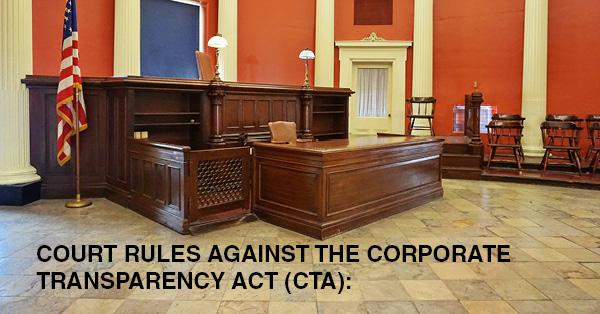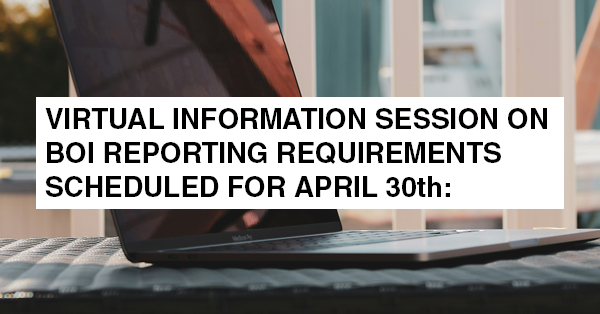COURT RULES AGAINST THE CORPORATE TRANSPARENCY ACT (CTA):

A federal judge has just ruled that the Corporate Transparency Act is unconstitutional, marking the end of a 16-month legal battle led by the National Small Business Association and supported by S-Corp and the members of our Main Street Employers coalition.
Recognizing that the federal government went far beyond their enumerated powers in enacting and implementing the law, the National Small Business Association filed a legal challenge back in 2022, alleging that it violates a laundry list of constitutional protections. S-Corp and our Main Street Employer allies were strong supporters of the suit from the beginning.
As it turns out, presiding Federal District Court Judge Liles Burke agrees with our concerns. In a ruling recently issued he wrote:
When Congress passed the 2021 National Defense Authorization Act, it included a bill called the Corporate Transparency Act (“CTA”). Although the CTA made up just over 21 pages of the NDAA’s nearly 1,500-page total, the law packs a significant regulatory punch, requiring most entities incorporated under State law to disclose personal stakeholder information to the Treasury Department’s criminal enforcement arm.
By requiring these disclosures, Congress aimed to prevent financial crimes like money laundering and tax evasion, which are often committed through shell corporations. Broadly defined, a shell corporation is a legal entity with no (or minimal) employees, customers, business, or assets. Although shell corporations serve many legitimate purposes, it’s also possible to disguise the identity of interested individuals and the flow of money by layering shell companies on top of each other, “such that each time an investigator obtains ownership records for a domestic or foreign entity, the newly identified entity is yet another corporate entity, necessitating a repeat of the same process[.]” Pub. L. 116-283 § 6402(4).
Yet corporate formation includes far more than for-profit enterprise. Each year, the States grant formal status to millions of entities that can and do serve “any lawful purpose,” including benefit corporations, non-profits, holding companies, political organizations, and everything in between.
With that in mind, this case presents a deceptively simple question: Does the Constitution give Congress the power to regulate those millions of entities and their stakeholders the moment they obtain a formal corporate status from a State? The Government thinks so. While it acknowledges that Congress “can exercise only the powers granted to it,” the Government says that the CTA is within Congress’ broad powers to regulate commerce, oversee foreign affairs and national security, and impose taxes and related regulations.
The Government’s arguments are not supported by precedent. Because the CTA exceeds the Constitution’s limits on the legislative branch and lacks a sufficient nexus to any enumerated power to be a necessary or proper means of achieving Congress’ policy goals, the Plaintiffs are entitled to judgment as a matter of law. As a result, the Court GRANTS the Plaintiffs’ motion for summary judgment and DENIES the Government’s motion to dismiss and alternative cross-motion for summary judgment.
The ruling bars the U.S. Treasury from enforcing the CTA against the Plaintiffs but does not enjoin enforcement against others. Judge Burke granted the Plaintiffs’ motion for summary judgment. In the final order, he ruled that the Defendants (Janet Yellen, in her official capacity as the Secretary of the United States Department of the Treasury, the Treasury, and Himamauli Das, in his official capacity as Acting Director of the Financial Crimes Enforcement Network) along with any other agency or employee acting on behalf of the United States, are permanently enjoined—barred—from enforcing the CTA against the Plaintiffs.
That qualification—the government is enjoined from enforcing the CTA against the Plaintiffs named in the suit—is important because it's narrow, as technically they could still enforce the CTA on those not included in the complaint. Other lawsuits are now anticipated to include all businesses in the ruling.
The Department of Justice is almost certain to appeal the ruling, so the court challenge is far from over.




